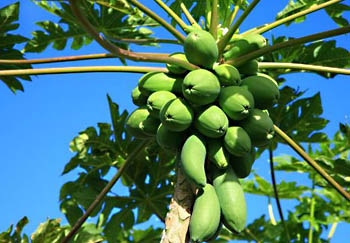Les agriculteurs américains qui misent sur la culture du soja sans OGM sont toujours plus nombreux. Ce qui leur permet d’obtenir des prix plus élevés sur le marché avec un coût nettement inférieur pour les semences. Au cours d’une série d’expériences, le rendement des variétés sans OGM était en outre plus élevé que celui des variétés GM courantes. Aux Etats-Unis aussi, la demande de soja sans génie génétique est en augmentation constante. (Iowa Farmer Today, 02.04.15)
Quelle: Iowa Farmer Today, 02.04.15
http://www.iowafarmertoday.com/news/crop/non-gmo-premium-draws-growers/article_13cee7c4-d88a-11e4-81c7-0fc155a05c10.html
Non-GMO premium draws growers
With lower commodity prices, farmers are rethinking their budgets, input costs and premiums.
One of those decisions might include selecting non-GMO soybean varieties.
“Over the last few years in our local area, there have not been very many farmers that have grown non-GMO beans,” says Lynn Rohrscheib, Vermilion County farmer in Central Illinois. “But last year, we saw the numbers increase.”
Rohrscheib and her family have been a part of this movement for many years, planting both conventional and non-GMO beans.
“Then in 2014, we planted nothing but non-GMO soybeans,” she says.
Her family crunched the numbers and found they could increase profits if they weren’t paying a technology fee for GMO traits in addition to receiving a premium on non-GMO ranging from $1.80 to $2.10 per bushel.
Luke Davies, DuPont Pioneer commercial unit lead, says there has been a strong market for non-GMO soybeans because there has been strong demand.
Trek Murray, Beck’s Hybrids quality traits market manager, says, “This type of market provides an extra income for growers which provides options they might not have had before.”
Rohrscheib, who farms with her parents and younger sister, has been experimenting with non-GMO soybean varieties for several years. Throughout the last few years of the trials on the Fairmount farm, some non-GMO soybeans out-produced the conventional fields.
“Several local farmers and friends kept up with our trials,” says Rohrscheib, who is also an LG Seeds dealer. “Because of our trials and premium programs for these specialized beans, many farmers in our area are converting completely or at least allocating a portion of their acres to non-GMO beans.”
However, the management of specialty beans is a bit more intense than conventional beans.
“If you are growing both types of beans, farmers need to make sure that they are stored in two totally different bins for purity reasons,” she says. “Also, when combining beans, farmers need to make sure the equipment it thoroughly cleaned or different equipment is used.”
Prior to 2014, they had designated non-GMO bins so there was no confusion, or they would haul directly to the elevator to ensure no contamination.
“It is also vital to keep track of which fields are which during spraying time,” she explains. “It could end badly if the wrong field is sprayed with the wrong chemical.”
But, the premium could make it worth the extra caution.
“There are not a lot of acres that go into non-GMO beans, but the farmers that are in this portion of the industry believe that the extra management it worth it for the financial potential,” Murray says.
Davies says it can take time to perfect the new management requirements.
“Growing high-yielding non-GMO beans is an art, and those who have been in the industry awhile have mastered that art,” he says.

